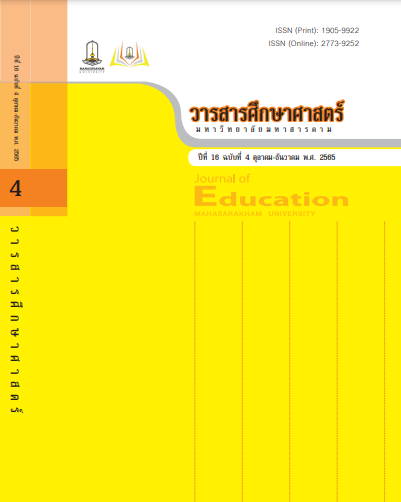The home-based learning management integration with flipped classroom [online] to develop foundational Mathematics skills for early childhood in coronavirus pandemic
Main Article Content
Abstract
The objectives of this research were: 1) to compare young children’s foundational mathematics skills both before and after who got learning management to develop foundational Mathematics skills for early childhood in coronavirus pandemic, and 2) to study parents’ satisfaction with the home-based learning management integration with flipped classroom [online] to develop foundational Mathematics skills for early childhood in coronavirus pandemic. The population of this research was 120
young children aged 5-6 years who are studying in kindergarten 3 the academic year 2021 in Lakmuang Mahasarakham School using cluster sampling technique for sample group was 24 young children in kindergarten 3 room 5. The research instruments used were: 1) the learning lesson plans, 2) the learning achievement test, and 3) the questionnaire concerning satisfaction. The research instruments used were: 1) the learning lesson plans, 2) the learning achievement test, and 3) the questionnaire concerning satisfaction. The statistics used for data analysis included percentage, mean, standard deviation, and t-test. The research findings indicated that: 1) The students had higher academic achievement scores in post-study than pre-study at the significant level of.05, and 2) The parents of young children in kindergarten 3/5 have the satisfaction with the home-based learning management integration with flip classroom [online] to develop foundational Mathematics skills for young children in coronavirus pandemic at a higher level
Downloads
Article Details

This work is licensed under a Creative Commons Attribution-NonCommercial-NoDerivatives 4.0 International License.
References
กุลยา ตันติผลาชีวะ. (2549). การสอนคณิตศาสตร์เด็กปฐมวัย. วารสารการศึกษาปฐมวัย, 10(2), 37-40.
จิราพร นิลมุก. (2560). การพัฒนาทักษะพื้นฐานทางคณิตศาสตร์ของเด็กปฐมวัยโดยการจัด ประสบการณ์ด้วยกระบวนการวิจัย. วิทยานิพนธ์ปริญญามหาบัณฑิต. มหาวิทยาลัยราชภัฏพิบูลสงคราม.
ประจักษ์ เอนกฤทธิ์มงคล. (2560). การพัฒนาความสามารถการคิดวิเคราะห์พื้นฐานทางคณิตศาสตร์ของเด็กระดับปฐมวัยโดยใช้ชุดกิจกรรม. วิทยานิพนธ์ปริญญามหาบัณฑิต. มหาวิทยาลัยธุรกิจบัณฑิตย์.
พงศ์ทัศ วนิชานันท์. (2564). การศึกษาพื้นฐานในยุค โควิด-19: จะเปิด-ปิดโรงเรียนอย่างไร?. https://tdri.or.th/2020/05/basiceducation-in-covid-19-crisis-reopening-school-after-lockdown/
พิมพันธ์ เดชะคุปต์ และพเยาว์ ยินดีสุข. (2557). การจัดการเรียนรู้ในศตวรรษที่ 21. สำ นักพิมพ์แห่งจุฬาลงกรณ์มหาวิทยาลัย.
วิจารณ์ พานิช. (2556). ครูเพื่อศิษย์สร้างห้องเรียนกลับทาง. มูลนิธิสยามกัมมาจล.
ศิริพันธุ์ เตชิตธนวรรธน์. (2564). การแก้ปัญหาเด็กจำ ตัวเลขไม่ได้และไม่รู้ค่าของจำ นวน 1-10 (รูปแบบการจัดการเรียนการสอน On- hand /on -demand) ในสถานการณ์การแพร่ระบาดของเชื้อไวรัสโคโรนา. งานวิจัยในชั้นเรียน. โรงเรียนบ้านหนองจอกวังกำ แพง.
สถาบันส่งเสริมการสอนวิทยาศาสตร์และเทคโนโลยี (สสวท.). (2563). กรอบการเรียนรู้ และแนวทางการจัดประสบการณ์การเรียนรู้บูรณาการวิทยาศาสตร์ เทคโนโลยี และคณิตศาสตร์ในระดับปฐมวัย ตามหลักสูตรการศึกษาปฐมวัย พุทธศักราช 2560. โกโกพริ้นท์ (ไทยแลนด์)
สำนักงานกองทุนสนับสนุนการสร้างเสริมสุขภาพ (สสส.). (2564). Home-Based Learning สิงคโปร์ ต้นแบบการศึกษายุคโควิดระบาด. https://shorturl.asia/sE7h8
สำนักนายกรัฐมนตรี. (2560). แผนพัฒนาเศรษฐกิจและสังคมแห่งชาติ ฉบับที่สิบสอง พ.ศ.2560-2564. สำนักงานคณะกรรมการพัฒนาการเศรษฐกิจและสังคมแห่งชาติ.
อัมพร ม้าคนอง. (2557). คณิตศาสตร์สำ หรับครูมัธยม. ศูนย์ตำ ราและเอกสารทางวิชาการ คณะครุศาสตร์ จุฬาลงกรณ์มหาวิทยาลัย.
Chen, J. A., & Pajares, F. (2010). Implicit theories of ability of grade 6 science students: Relation to epistemological beliefs and academic motivation and achievement in science. Contemporary Educational Psychology, 35(1), 75–87.
Jeremy, F. S. (2007). The effects of the classroom flip on the learning environment: A comparison of learning activity in a traditional classroom and a flip classroom that used an intelligent tutoring system [Doctoral dissertation]. Ohio State University, USA.
Pollio, H. R., & Whitacre, J. D. (1970). Some observation on the use of natural numbers by preschool children. Perceptual and Motor Skills, 30(1), 167-174


